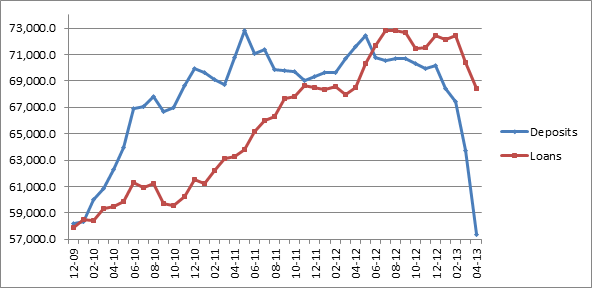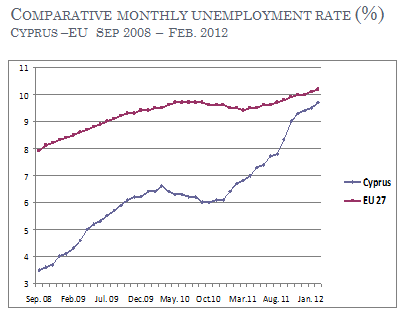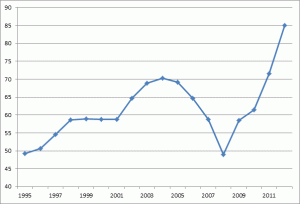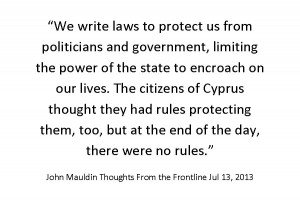Is This Country Different? Will the Big Bang Be a Shock?

The biggest risk is that created by our own politicians and institutions – by those we trust to somehow protect us from risk.
By John Mauldin
Future shock is the shattering stress and disorientation that we induce in individuals by subjecting them to too much change in too short a time.
– Alvin Toffler
What is it about humans that we fail to see a crisis in advance, yet when we look back, its likelihood or  inevitability so often seems blindingly obvious? Rather than a flaw, our under-reliance on foresight as opposed to hindsight is perhaps a necessary evolutionary design feature that has allowed us to make rapid progress as a species (especially over the last few thousand years), but in a complex modern society it can really create quite the crisis for individuals. This week we resume our musings about Cyprus, to see what that tiny island can teach us about our own personal need to engage in ongoing critical analysis of our lives and investment portfolios. Cyprus is not Greece or France or Spain or Japan or the US or … (pick a country). I get that. No two situations are the same, but there may be a rhyme or two here that is instructive.
inevitability so often seems blindingly obvious? Rather than a flaw, our under-reliance on foresight as opposed to hindsight is perhaps a necessary evolutionary design feature that has allowed us to make rapid progress as a species (especially over the last few thousand years), but in a complex modern society it can really create quite the crisis for individuals. This week we resume our musings about Cyprus, to see what that tiny island can teach us about our own personal need to engage in ongoing critical analysis of our lives and investment portfolios. Cyprus is not Greece or France or Spain or Japan or the US or … (pick a country). I get that. No two situations are the same, but there may be a rhyme or two here that is instructive.
In 1974, Turkey invaded Cyprus. Eventually the island was divided into two zones, and Greeks in the Turkish zone, like Turks in the Greek zone, were forced to leave with only the clothes on their backs and little else. That was a defining moment for Cyprus, and the aftershock is still evident when you get past the normal polite conversation. Plus, the wall dividing the two countries is always there when you are in the capital city of Nicosia, although lately there are a few places where you can cross into the other zone. The first night I was in Nicosia, we ate dinner outside at a Greek taverna (what else?) that stands almost in the shadow of the wall.
One hundred years after the Civil War, the South of my childhood was still mixed up with the aftereffects of that war. The war in Cyprus was less than 40 years ago. Another evening we went to a local club where the members were Greeks who had been expelled from a particular neighborhood in the Turkish-occupied area. Many looked young enough that they could not have been alive during the war, but the memory of the “old neighborhood” was still strong among them.
 These people lost homes and businesses, jobs – everything. They had to start over. (I am sure it was that way for the Turks who had to relocate as well.) But for the next 40 years there was very steady economic growth, 4% or so a year over time. The people took advantage of what they had. There was no university, so children went abroad to study and work and then came back, generally with skills. The legal and accounting professions grew particularly strong. Like two other former British island colonies, Singapore and Hong Kong, Cyprus became a financial center. Fifty double tax treaties later, the island had become a place to domicile companies, handle taxes and accounting, etc.
These people lost homes and businesses, jobs – everything. They had to start over. (I am sure it was that way for the Turks who had to relocate as well.) But for the next 40 years there was very steady economic growth, 4% or so a year over time. The people took advantage of what they had. There was no university, so children went abroad to study and work and then came back, generally with skills. The legal and accounting professions grew particularly strong. Like two other former British island colonies, Singapore and Hong Kong, Cyprus became a financial center. Fifty double tax treaties later, the island had become a place to domicile companies, handle taxes and accounting, etc.
And then they branched out into banking. After the creation of the euro, the deposit base of Cypriot banks went through the roof, until it was up to six times the size of local GDP (depending on whom you believe – official sources make it closer to five times). By some measures, Cyprus had the second wealthiest population in Europe and certainly one of the best educated. Twenty-five percent of the world’s ships were operated under the flag of Cyprus. Because the country had been a member of the nonaligned movement in the ’80s (remember that?), it had good ties (and double tax treaties) with Eastern Europe and the USSR. Some of the kids went to university in Russia and developed contacts there. After the collapse of the Soviet Union, it was natural for Russians to use Cyprus as a conduit to the West.
Cyprus has, by some accounts, the best beaches in the Mediterranean, and so more and more people came and built vacation homes. They brought their money with them and deposited it in the local banks and took out loans to build their homes. Real estate prices climbed and climbed. Below are Cypriot bank deposits and loans from 2009 through April of this year (data from the central bank).

Unemployment was quite low, less than 4% in 2008, although the global credit crisis led to a gradual rise (though nothing like that seen in the rest of Europe). Much of the new unemployment was in the construction industry, which fell into a slump along with the rest of Europe during the crisis.

Banking soon became the biggest industry. There were more banking branches per capita in Cyprus than anywhere else in the world, more than double the European average. And there were over 40% more employees per branch than in the average eurozone country. Money was easy to get, so debt exploded by over 50% in both businesses and households in just six years, from 2005–2011.
The country had always run a current account deficit, but by 2008 that deficit had topped 15%, keeping pace with Greece’s and Portugal’s. However, earnings and productivity had more than kept up. Cypriots worked hard and offered good value for their services. They saw themselves as different from the other Southern European countries. But, as in much of the rest of Europe, public-sector employment doubled from 1990, with the second-highest government wage bill (behind Denmark’s) and a monstrous 50% growth in social benefits in the last 10 years.
Still, starting in 2003, public debt-to-GDP actually fell. Why ring the alarm bell when things are getting better?
Cyprus: Public sector debt as % GDP 1995-2012

There were in fact no alarms bells ringing as 2012 opened. But there should have been. Cyrpiot banks  were flush with cash. They bought foreign banks in Greece and Russia. They made ever more loans and then looked around and decided that Greek sovereign debt was something they needed more of. And then came the Greek sovereign debt crisis, and the capital base of the Cypriot banks was essentially wiped out. But the ECB and the EU had bailed out Irish and Spanish banks; and so depositors in Cyprus, many of them Russian, decided, along with the local citizens, to leave their money in the banks.
were flush with cash. They bought foreign banks in Greece and Russia. They made ever more loans and then looked around and decided that Greek sovereign debt was something they needed more of. And then came the Greek sovereign debt crisis, and the capital base of the Cypriot banks was essentially wiped out. But the ECB and the EU had bailed out Irish and Spanish banks; and so depositors in Cyprus, many of them Russian, decided, along with the local citizens, to leave their money in the banks.
The country had been under the parliamentary control of the Communist Party since 2008. Seriously. Supported by the Orthodox Church. (Note that public debt began its serious rise after the communists came to power). No one reined in the banks, and they grew ever fatter and more exposed until the crisis hit. Then Cyprus could no longer fund its debt and needed EU help. Further, the Central Bank of Cyprus (not to be confused with the commercial Bank of Cyprus) had to make emergency liquidity loans to Cypriot banks that had to meet demands for withdrawals and could no longer raise capital. There was not a bank run, but there was a fast-paced walk.
The ECB balked, as the quality of the collateral offered did not come close to the standards of the Emergency Lending Assistance (ELA) program. The government of Cyprus needed money to fund its basic needs as well as to “roll over” its debt as it came due. The EU basically declined to negotiate, as there was a Cypriot election scheduled for late February, and the EU preferred to wait to see the results before acting. There was talk of a “bail-in” (where depositors would shoulder some of the loss), but as usual that proposal came from the Germans, and the rest of Europe would surely not agree.
The new president assumed office and saw immediately that the country was in trouble. He tapped Michael Sarris, a “technocrat,” to be his finance minister. Sarris was the man who had helped bring Cyprus into the euro and who oversaw the reduction in Cypriot debt. While he was not a member of the winning political party, he had been at the World Bank and had relationships with many of the finance heads of Europe.
Sarris went to Brussels, only to find no friends of Cyprus there. The Germans privately told him they would approve no bailout of Russian depositors (rumored to account for over half of the base of some of the banks) prior to the German elections this fall. Cyprus was seen as a money haven and a place for rather loose tax accounting. I have to admit that many of the Cypriots I talked to knew that money laundering was going on. It was a very open secret. Cyprus had very strict rules, but it seems there were ways to engineer exceptions.
In the end, Cyprus makes no difference – that was the perception in Europe, and while they were just  talking a few billion euros here and there, a fraction of what Ireland or Spain needed, there was just no sympathy for Cyprus. Many of the European finance ministers wanted to establish the questionable principle that bank deposits were no longer sacrosanct, and Cyprus was just not seen as a systemic risk. The best deal Sarris could get was a 6.75% “tax” on deposits of less than €100,000 and 9.9% above that, with the aim of raising €5.8 billion. That was on a weekend, and by Monday, when Sarris returned, the indignation in Cyprus had grown to the point that not one politician voted to accept the deal.
talking a few billion euros here and there, a fraction of what Ireland or Spain needed, there was just no sympathy for Cyprus. Many of the European finance ministers wanted to establish the questionable principle that bank deposits were no longer sacrosanct, and Cyprus was just not seen as a systemic risk. The best deal Sarris could get was a 6.75% “tax” on deposits of less than €100,000 and 9.9% above that, with the aim of raising €5.8 billion. That was on a weekend, and by Monday, when Sarris returned, the indignation in Cyprus had grown to the point that not one politician voted to accept the deal.
A bank holiday was declared and Laiki Bank was put into receivership and closed as a “bad bank,” but within a week the EU decided to insure all deposits up to €100,000, the number that “everyone” had understood to be the safe deposit amount. The banks eventually reopened, but Cyprus placed capital controls on deposits and limited withdrawals. A euro in a Cypriot bank was no longer the same as a euro in an Irish bank.
The Economist wrote shortly thereafter:
“The Cypriot deal has no coherence in the larger context. The euro crisis has been in abeyance for a few months, thanks largely to the readiness of the European Central Bank to intervene to help struggling countries. The ECB’s price for helping countries is to insist they go into a bail-out programme. The political price of going into a programme has just gone up, so the ECB’s safety net looks a little thinner. The bail-out appears to move Europe further away from the institutional reforms that are needed to resolve the crisis once and for all. Rather than using the European Stability Mechanism to recapitalise banks, and thereby weaken the link between banks and their governments, the euro zone continues to equate bank bail-outs with sovereign bail- outs. As for debt mutualisation, after imposing losses on local depositors, the price of support from the rest of Europe is arguably costlier now than it ever has been.”
Since then, the crisis has deepened. Deposits of over €100,000 in Laiki Bank, which was the second largest bank in Cyprus, have been completely wiped out. The bad debts of Laiki Bank were forced into the Bank of Cyprus, saddling their depositor base with approximately 60% losses.
If you had a business with over €100,000 deposited in Cyprus, you are likely out of business. Many businesses that were going concerns on March 14, 2013, when the crisis fully erupted, were out of business a few days later. All the employees lost their jobs and their benefits. Unemployment will soon reach 20%. For now, all of the branch banks are open, but at least half will soon be shut.
On an ironic note, the EU resisted any talk of Russian banks coming in to take over the failed Cypriot banks. Now it looks as if Russian citizens may own over 50% of whatever is left of the Bank of Cyprus.
Cypriots are deeply shocked by these events. From “insiders” who sat on boards to politicians and ordinary citizens, no one can believe that the EU treated them the way they did. I was asked time and again, “How could this happen?” and not just by ordinary citizens.
 I talked with one lady who had just retired from the Bank of Cyprus. She had 100% of her pension and life savings at the bank and now faces losses of up to 60%. She had no idea the crisis was coming. Interestingly, she and others I spoke to insisted that the Bank of Cyprus was a good bank. But when asked if she would redeposit her money in a Cypriot bank when (if) she ever gets it out, she shook her head no. The trust in the system is gone.
I talked with one lady who had just retired from the Bank of Cyprus. She had 100% of her pension and life savings at the bank and now faces losses of up to 60%. She had no idea the crisis was coming. Interestingly, she and others I spoke to insisted that the Bank of Cyprus was a good bank. But when asked if she would redeposit her money in a Cypriot bank when (if) she ever gets it out, she shook her head no. The trust in the system is gone.
I talked with Symeon Matsis, a man in his early 70s who was at one time in charge of planning at the Ministry of Finance. He carried a copy of This Time Is Different by Rogoff and Reinhart. It was dog-eared and full of notes. “I am reading it so I can try to understand what happened to us. The more I read the more I understand that they were describing Cyprus. And we did think that ‘This country is different.’ Which is why the crisis has been such a shock to our local culture.”
The Cypriots believed not just that their country was different but also that the stability they had seen for 40 years was normal and easy to achieve. Why would it end? They were just doing their jobs, and everything seemed OK … until it wasn’t.
Humans are hardwired to be optimists. Keeping our chins up is the only way we can keep working today and have hope for the future. If we lose that optimism, what Keynes called our “animal spirits,” then why should we take risks? And the growth of free markets and capitalism over the last 500 years is nothing if not the growth in our ability to tame risk, through institutions such as insurance companies and corporations and mechanisms such as securitization and pensions. (I highly recommend the masterful book, Against the Gods: The Remarkable Story of Risk, by the late and sorely missed Peter Bernstein. This is on my list of must-read books for everyone who asks.)
But with all the controls we have created, we still have not reduced risk to nothing. And the biggest risk is that created by our own politicians and institutions – by those we trust to somehow protect us from risk. [emphasis added]
We write laws to protect us from politicians and government, limiting the power of the state to encroach  on our lives. The citizens of Cyprus thought they had rules protecting them, too, but at the end of the day, there were no rules.
on our lives. The citizens of Cyprus thought they had rules protecting them, too, but at the end of the day, there were no rules.
The central bankers and finance ministers of Europe are making the rules up as they go along. The monstrously long EU treaties and other eurozone agreements are wide open to bureaucratic interpretation.
If you live in the EU, you now must understand that the central risk to your financial well-being is the very governments you have asked to protect you from that risk. Many of those governments have made promises they cannot keep. I wrote a few weeks ago about the problems in France. I heard from some French readers who disagreed with me. The gist of their arguments boiled down to “we are different.”
I agree that France is different in the sense that France will find some uniquely French way to deal with its crisis of too much debt and leverage, a government that is too large, and a system that is sclerotic. But whatever that is, it won’t save France. French citizens and their politicians feel that their pensions, investments, and lifestyles are safe. Yes, things may have to change, they say, but not in any fundamental sort of way. They feel pretty much like the citizens of Cyprus did until March.
The word catastrophe is the same in English and French. And at some time in the future, lacking serious reform, a catastrophe is what France is facing. The same is true of dozens of countries in the “developed” world.
We love to tell ourselves that this time is different. But outcomes among countries with debt and deficits out of control, constrained by a limited ability to grow their way out of their problems, are unmistakably similar. Each country has its own reasons for thinking it is different, and right up until the end it goes on telling itself that it is. And then people are shocked when one day they wake up to a very different reality.
Michael Sarris did not come back empty-handed. He came back with billions of euros from the EU and the ECB. It just wasn’t enough to keep things the way they were. The same plotline is repeated in Greece, Spain, and the rest of peripheral Europe.
Europe is making up the rules to deal with its crisis. Do you remember my writing about the very creative way the Irish dealt with their debt? Where was that in the rules? When the next phase of the crisis hits, the Europeans will make up more new rules. And that near certainty poses a serious risk for Europe.
 Of course, we in the US are different. We have the rule of law. That’s what we all learn in school and what we keep telling ourselves, anyhow. Well, except that we find the President now wants not to have to deal with a law he helped pass, and so some third assistant at Treasury was appointed to mention as everyone went home for the holiday weekend that parts of the Affordable Care Act will be postponed without consulting with Congress, which is supposed to be involved in the whole law thing. [emphasis added]
Of course, we in the US are different. We have the rule of law. That’s what we all learn in school and what we keep telling ourselves, anyhow. Well, except that we find the President now wants not to have to deal with a law he helped pass, and so some third assistant at Treasury was appointed to mention as everyone went home for the holiday weekend that parts of the Affordable Care Act will be postponed without consulting with Congress, which is supposed to be involved in the whole law thing. [emphasis added]
It’s not just this president; it’s everywhere. We have wandered far down the path from the rule of law to rule by lawyers. We have a Congress that refuses to deal with our deficit crisis in any manner. We have a central bank that is afraid to let the stock market learn to cope without easy money and financial repression, thereby making the bankers and finance world rich but hurting the average citizen. Indeed, low rates are killing those who worked and saved all their lives and now need to receive at least modest returns on their savings just to live.
My suggestion is that you pay attention to what is going on around you. If things are out of balance, do what you can to not get caught in the problem. It is almost never, ever different this time. You do not want to experience your own personal Bang! moment.
Copyright 2013 John Mauldin. All Rights Reserved. Used with permission.
Thoughts From the Frontline and MauldinEconomics.com is not an offering for any investment. John Mauldin is President of Business Marketing Group. He also is the President of Millennium Wave Advisors, LLC (MWA) which is an investment advisory firm registered with multiple states, President and registered representative of Millennium Wave Securities, LLC, (MWS) member FINRA, SIPC. MWS is also a Commodity Pool Operator (CPO) and a Commodity Trading Advisor (CTA) registered with the CFTC, as well as an Introducing Broker (IB) and NFA Member. Millennium Wave Investments is a dba of MWA LLC and MWS LLC.
Editors note:
usACTIONnews nor any of its owners or employees have any interest or investments or any relationship with John Mauldin or Business Marketing Group or any of its affiliations. We just felt this is an important and informative article on the ultimate destruction of America caused by liberal/progressive/socialist policies. Politics is life and death. It effects everything. Get involved.

Also please consider:
Government Never Has, and Never Will, Create Progress
A Message from Lord Vader
Is Government Lying About Inflation? Yes!
Wake Up, Gulliver: The Lilliputians Are Almost Done
Don’t Cry For Me, America: Comparing Argentina’s Fascist Perón to Obama
America Waking Up to Scandalous, Lying O’ministration
Mark Levin: Obama is a Marxist
The Ferengi Are Running Washington
Has Obama Already Bankrupted America?
The Progressive’s Foundation of Lies
The Chicagoization of America
Our Shameful President’s Thugocracy
Why is Anyone Surprised? U.S. Has Been Chicagoized
Why Things Will Get Worse — Much Worse
Obama Has Stolen $5.3 Trillion From Our Children In Order To Make Himself Look Good
9/12 – the Manhattan attack that gave us Obama
The Corruption of America
Debt quotes
Obama’s Achievement – Gov’t Has Become Gigantic Wealth-Transfer Machine
What Will It Take?
Obama’s “Fairness” is Pure Communism
Socialism Breeds Tyranny and Disparity
Crony capitalism is failing; let’s try the real thing
The Corruption of America
A Nation of Government Dependents?
The Self-Imposed Slavery of the Redistribution State
Obama Leading Us to Liberal Utopia Like Detroit
Obama leads “Forward” to ruin and destruction
America’s Liberal Government Ruling Class
Detroit “is a graveyard of socialism in America”
Zombified Cities Roundup: Detroit Becomes Dumping Ground for the Dead; Financial Urgency in Miami; Oakland Pension Time Bomb; How Pensions Crashed Stockton and San Bernardino
Formerly Great Cities All Over America Are Turning Into Open, Festering Sores
Public unions pushing cities to bankruptcy
Stockton California Joins Cities Bankrupted by Unions
The liberal union dream come true – Detroit
Help Make A Difference By Sharing These Articles On Facebook, Twitter And Elsewhere:
